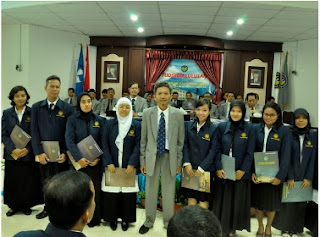Welcoming
speech from the Director of the Graduate school, Yogyakarta State University to Michigan State University's Graduate Students
Assalamu’alaikum
wr.,wb.,:
Good morning
ladies and gentlemen,
The
honorable delegates from Michigan State University, who are led by Prof. Lynn
Paine, the Director and Assistant Dean for the Office of International Studies
in Education (OISE) and also Prof. Laura Apol.
And
all of the respectable Yogyakarta State University professors, faculty members,
and students, as well as all of our invitees that I cannot mention one by one.
Welcome to the Graduate School of Yogyakarta State University.
Alhamdulillah
and praise for Allah the almighty for all His blessing that we can all gather
in this beautiful morning to welcome our special guests from Michigan State
University, the participants and leaders of the Fellowship to Enhance Global
Understanding to Indonesia of 2015.
It is
indeed a great honor for myself and the graduate school to host the 2015 FEGU
from the College of Education, MSU. This opportunity is not an instant process
that is bestowed upon us. It is a long process that is nurtured from both sides
since 2013 when the first FEGU trip visited our campus as part of their program
in Indonesia. Even
though it was only a one-day visit, our commitment to sustain this
collaborative efforts and continue the partnership with MSU has come a long
way. In 2014, our Rector, Vice Rector IV, and our own chair of the Research and
Evaluation in Education in the graduate program came to MSU to continue the
conversation of having a more engaging partnership between the two
universities.
Honorable
guests, although this is the second MSU visit to YSU, it is in fact, the first
time that YSU fully responsible in hosting the MSU FEGU trip to Indonesia, and
hopefully will not be the last!
Today,
we are all here, once again, to strengthen the international partnership that
will surely benefit both sides from our intensive interactions in the next 10 days
we are together. Both MSU and YSU have so much that we can offerto each other,
academically and culturally. We have two distinguished professors from MSU
leading this year FEGU trip to Indonesia who can share their expertise in comparative
and international research, and in the field of children and youth literacy.
The MSU students also come from various backgrounds such teacher education,
education administration, higher adult and lifelong education, education
psychology, mathematics education and also science education that we can
certainly benefit from.
From
YSU, not only that we have involved the professors and other faculty members to
be the host families, but we also invited 25 graduate students to be their
buddies during their stay in Yogyakarta. This close interaction at home with
the host families and with the buddies on campus will provide our MSU guests
opportunities to learn the academic and cultural life of educators in
Indonesia.
As a
host, we have facilitated our MSU guests to have a meeting with the National
Board of Education Standards and the Ministry of Education and Culture in
Jakarta last week. We also facilitate their meetings with two centers at Gadjah Mada University: The center for peace and
security; and also the center for religious and cross-cultural studies. Later
this afternoon, we have arranged a meeting with UIN Sunan Kalijaga to meet with our guest to learn more
about their interfaith dialogue programs.
In
our own campus, to start with, we are going to have a lecture on teacher
learning in Indonesia this morning, right (June 15, 2015) in this room. During
the week, we have arranged a one-day seminar: a joint presentation by YSU and
MSU doctoral students to talk about the issues of national standards and
evaluation, curriculum, and also teacher learning and professional development
that have been trending topics in USA and Indonesia. We will also have a
half-day workshop and presentation in the college of education, and in the
college of language and arts.
In
addition to that, we are taking our guest to see four different schools in the
area. We have on our list: SD Model, a public school that has been a model to
develop a quality elementary school; SMA 9 Yogya, a high school that has been
our lab school for s quite a long time; SD Muhammadiyah Condong Catur, a model of a private school; and SMKN 1
Depok, a vocational school that is unique in comparison to a regular high
school.
Our
honorable guests, the fact that this is the first time for YSU to host a
learning abroad program such as this, it will give us a model that can be
adopted and later be developed for any other programs that are similar in
nature be it with western universities or with our closer counterparts in Asia.
This can also be a model for us to send our own graduate students abroad.
This
great opportunity, of course, will be a starting point for other collaboration
that we will have with MSU, for our faculty members and for students at the
graduate school in particular, and at Yogyakarta State in general.
Last
but not least, on behalf of the graduate school, I would like to thank the PPs's International Affairs and Partnership under the leadership of Dwi S. Yuliyanto, MA who has facilitated all this effort. Also, everyone in the graduate
school who are involved in making this collaboration to be a great success.
With this, I would like to officially open this
engagement.
May
Allah make everything easy for us and I wish all of us all the best, amin! Thank
you very much.
Wassalamu’alaikum
Wr., Wb.
Prof.
Dr. Zuhdan K Prasetyo, M.Ed.


